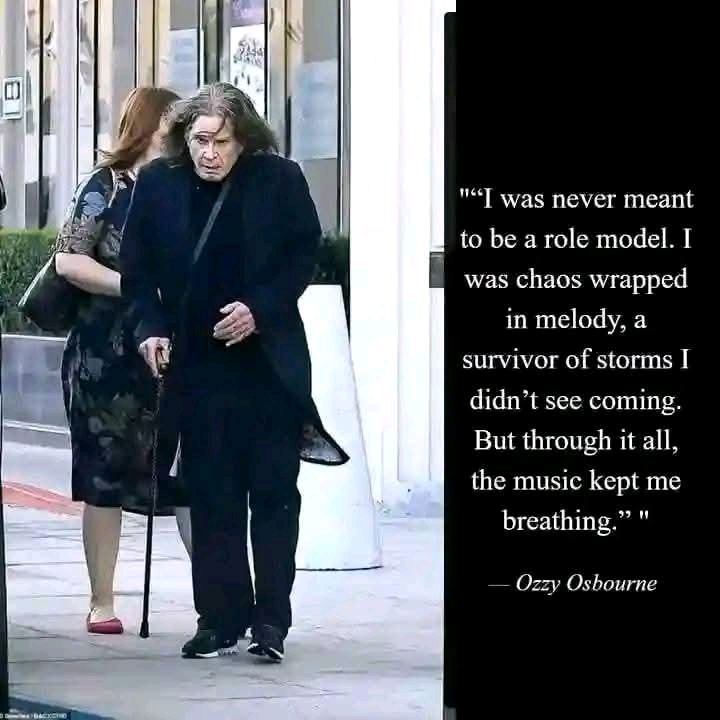
The Immortal Prince of Darkness: Ozzy Osbourne’s Monumental Legacy in Rock and Metal
Born John Michael Osbourne on December 3, 1948, in the industrial heart of Birmingham, England, Ozzy Osbourne would go on to become one of the most iconic figures in the history of rock and heavy metal. Known affectionately—and fearfully—as the “Prince of Darkness,” Ozzy’s journey from a working-class upbringing to global superstardom is one of reinvention, rebellion, and resilience. His life has been a wild rollercoaster of groundbreaking music, controversy, personal tragedy, and extraordinary comebacks that cemented his status as a living legend.
The Birth of Heavy Metal: Black Sabbath Era
Ozzy’s ascent began with the formation of Black Sabbath in 1968, alongside guitarist Tony Iommi, bassist Geezer Butler, and drummer Bill Ward. Together, they unleashed a sound the world had never heard—dark, thunderous, and foreboding. Their self-titled debut album Black Sabbath (1970) introduced eerie riffs and apocalyptic lyrics that set the stage for an entirely new genre: heavy metal. This was quickly followed by Paranoid and Master of Reality, albums that are still hailed as masterpieces. With tracks like “War Pigs,” “Iron Man,” and “Sweet Leaf,” Sabbath fused blues-rock roots with doomy overtones and a sinister edge, with Ozzy’s wailing vocals becoming the band’s signature.
More than just a vocalist, Ozzy was a magnetic frontman. His piercing stare, raw energy, and erratic onstage antics gave Sabbath a theatrical edge. Yet behind the scenes, tensions were rising—fueled by excessive partying and creative clashes. In 1979, Ozzy was fired from the band he helped create.
Reinvention Through Chaos: Solo Stardom
Most artists might have faded away, but Ozzy turned exile into evolution. His wife and future manager, Sharon Arden (now Osbourne), helped him bounce back with a vengeance. His debut solo album, Blizzard of Ozz (1980), was a defiant comeback that featured timeless tracks like “Crazy Train” and “Mr. Crowley.” The album introduced guitarist Randy Rhoads, whose neo-classical guitar style redefined metal virtuosity. Tragically, Rhoads died in a plane crash in 1982, but his influence lived on, and Ozzy’s career pressed forward.
Throughout the ’80s and ’90s, Ozzy released hit albums including Diary of a Madman, No More Tears, and Ozzmosis, solidifying his legacy as a solo titan. He also collaborated with future metal greats like Zakk Wylde, who brought Southern-rock fire to Ozzy’s anthems.
The 1990s also saw Ozzy create Ozzfest, a massive touring festival that gave rise to bands like Slipknot, Korn, and System of a Down—bringing heavy metal to new generations.
Reinvention Again: Reality TV Fame
Just when it seemed Ozzy had reached the peak of his musical career, he unexpectedly broke into mainstream pop culture with The Osbournes (2002–2005). The MTV reality series, showcasing the chaotic domestic life of Ozzy, Sharon, and their children Jack and Kelly, became a phenomenon. Millions were captivated by his mumbled speech, quirky sense of humor, and heartwarming family dynamics. He went from metal menace to beloved TV dad almost overnight.
Health Struggles and Indestructible Spirit
Despite a lifetime of hard living and several near-death experiences, Ozzy has proven to be astonishingly resilient. He has battled addiction, survived a near-fatal ATV accident, undergone multiple surgeries, and was diagnosed with Parkinson’s disease in 2020. Even so, his spirit remains unbreakable.
In 2006, Ozzy was inducted into the Rock and Roll Hall of Fame as part of Black Sabbath, honoring their role in birthing heavy metal. In 2024, he received a solo nomination, recognizing his impact as an individual artist—a rare dual honor.

His farewell tours have been both a celebration and a tribute to his lifelong connection with fans. Each performance has carried the weight of history, with tens of thousands singing along to the anthems of their youth. Even in a weakened physical state, Ozzy’s stage presence is nothing short of electric. As he once said, “Being on stage is the only time I truly feel alive.”
Legacy of the Prince of Darkness
Ozzy Osbourne is far more than a rock star. He’s a cultural institution. From biting the head off a bat to fronting sold-out tours in his seventies, he embodies the wild heart of rock and roll. He pushed boundaries musically and socially, inspiring artists across genres—from metal to hip-hop.
In Birmingham, the city that birthed him, there are calls for statues and museums in his honor. His influence echoes through every heavy metal riff, every scream of rebellion, and every misfit who found solace in the chaos.
In a world of imitation and trend-chasing, Ozzy remains defiantly original. Whether as a young Brummie dreamer, a metal god with Sabbath, a solo icon blazing his own path, or a beloved reality TV dad, Ozzy has never stopped evolving.
And as long as someone cranks up “Crazy Train” or “Iron Man,” Ozzy Osbourne will never truly say goodbye. 🤘“I am the Prince of Darkness, but I still got a heart,” Ozzy once said—and perhaps that’s why the world will never stop loving him.






